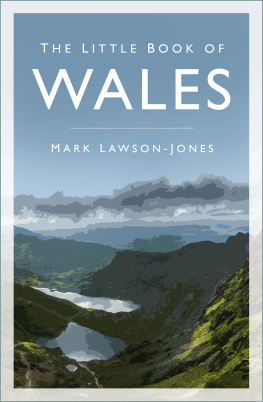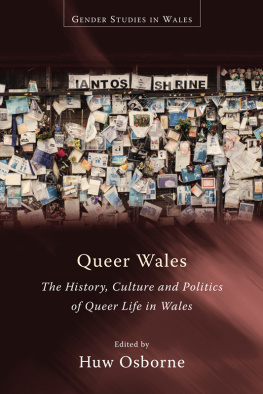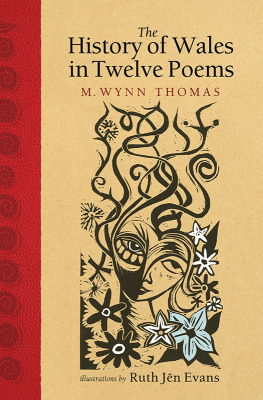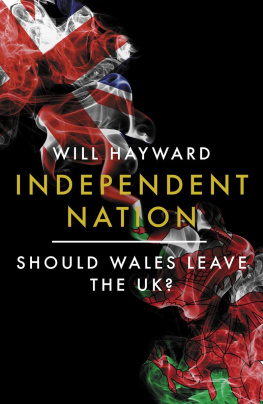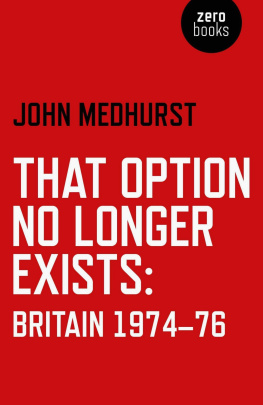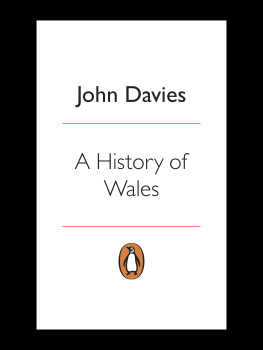A HISTORY OF
INDEPENDENT TELEVISION
IN WALES
Jamie Medhurst
Jamie Medhurst, 2010
All rights reserved. No part of this book may be reproduced in any material form (including photocopying or storing it in any medium by electronic means and whether or not transiently or incidentally to some other use of this publication) without the written permission of the copyright owner except in accordance with the provisions of the Copyright, Designs and Patents Act 1988. Applications for the copyright owners written permission to reproduce any part of this publication should be addressed to the University of Wales Press, 10 Columbus Walk, Brigantine Place, Cardiff, CF10 4UP.
www.uwp.co.uk
British Library CIP
A catalogue record for this book is available from the British Library.
ISBN 978-0-7083-2213-0
eISBN 978-1-78316-405-9
The right of Jamie Medhurst to be identified as author of this work has been asserted in accordance with sections 77, 78 and 79 of the Copyright, Designs and Patents Act 1988.
Contents
Acknowledgements
Explanatory notes
Television Wales and the West, 19561963:
Organisation and Control
Television Wales and the West, 19561963:
Programming and Critical Issues
Wales (West and North) Television, 19561963:
Formation and Control
Wales (West and North) Television, 19561963:
Operation, Programming and Demise
Television Wales and the West, 19641968:
Operation and Programming
Endnotes
References
Illustration
Acknowledgements
I am indebted to a great number of people who have helped me in ensuring that this book has seen the light of day. In particular, I would like to thank Professor Tom OMalley, colleague, critic, mentor and fellow media historian at Aberystwyth, for his help and support. At ITV Wales, Elis Owen, Shone Hughes, Sin Clwyd Roberts and Owain Meredith went above and beyond the call of duty by providing a base at Television Centre in Cardiff and answering countless questions related to the project. Lord Roberts of Conwy, former Welsh Controller and Executive Producer at TWW, gave generously of his time and allowed me to access his library, for which I am extremely grateful. I am certain that this book would not have been completed without the help of the aforementioned.
I would also like to thank the following for their help and advice: Professors Deian Hopkin, Adrian Kear, Martin Barker, Elan Closs Stephens, Kevin Williams and Jean Seaton; Drs Hugh Chignell, Cathy Johnson and Rob Turnock; Angela Jones, Library Services, ITV Wales; Hywel Wiliam, Head of Broadcasting and Telecommunications, OFCOM Cymru Wales. The following kindly gave permission to use copyrighted material or allowed me to access personal archives: Sian Eleri, Director of Marketing and Communications, Urdd Gobaith Cymru; Mrs C. M. Harries, Aberystwyth; Mrs Mari Ellis, Aberystwyth; Eleri Huws, Tal-y-bont; ITV Broadcasting Ltd; Punch Ltd. Since completing the research for the book, the archives and records of the Independent Television Authority (ITA), the Independent Broadcasting Authority (IBA) and the Independent Television Commission (ITC) have been deposited at Bournemouth University library and are available to academic researchers once again. Staff at the National Library of Wales, the Hugh Owen Library at Aberystwyth University, the National Archives in Kew, the British Library Newspaper Library in Colindale, the BBC Written Archives Centre and the British Film Institute in London have been patient and generous in their help.
I was fortunate to be granted a semesters research leave from Aberystwyth University during the 20078 academic session and, thanks to a research leave grant awarded by the Arts and Humanities Research Council (AHRC), was able to complete writing the book during the first semester of the 20089 session. I was also awarded a Sir David Hughes Parry Award from Aberystwyth University, which permitted me to undertake extensive archival work. I would therefore like to record my thanks to the University and to the AHRC.
Commissioner Sarah Lewis and members of the production team at the University of Wales Press have done an excellent job in preparing this book for publication and it has been a pleasure working with them. Needless to say, any mistakes which appear in this book are mine alone.
My family have, as always, been a tremendous support. To Barbara, Iori, Kate and Mari, I say a big thank you for providing support and sustenance (including copious amounts of homemade cake) at just the right times. Ceris and Alice effectively lost a husband and father respectively during my research leave and final stages of writing this book. I am eternally grateful to them for their love, patience and understanding whilst I have been foraging in archives in Aberystwyth, Cardiff and London and locked away in the study at home. I promise to make it up to you and to learn how to use the Playstation. Last, but by no means least, my parents, Heather and Brian Medhurst, have always been there for me. They have been a constant source of support and strength in so many ways. For this reason (and countless others), I dedicate this book to them with great love and affection.
Explanatory notes
Bands and channels in the 1950s and 1960s
International agreements had made available three Bands to Britain (I, III and IV), each of which contained a certain number of channels to be used for broadcasting. The BBC operated in Band I across five channels. This Band was low frequency and allowed for greater penetration via high-powered transmitters and a network of low-powered satellite transmitters. The ITA utilised four channels in Band III (Channels 8, 9, 10 and 11) in Wales. In August 1960, the ITA announced that it would use Channel 8 (from the Preseli transmitter) and Channel 10 (from the Arfon transmitter, which was yet to be completed) to provide a service for west Wales.
Parts of Channels 6 and 7 and Channels 12 and 13 would be available for use by a third UK-wide service (in addition to the existing BBC and ITV services) when it was deemed appropriate. The ITAs request to establish a new transmitter in Flint-Denbigh (on Channel 13 in Band III) had to be made to the Postmaster General. The allocation of Channel 13 to either the ITA or the BBC therefore required a political decision on the part of the Postmaster General over who should be allowed the channel, because its allocation would impact on the technical basis of any third, UK-wide, channel which formed part of government policy.
In the mid 1960s, the Postmaster General permitted the use of Channel 7 for the ITA from the St Hilary transmitter to allow the new Teledu Cymru to be transmitted to south Wales from February 1965, linking up with Channels 8, 10 and 11 to create an all-Wales service. The BBC had been granted permission to launch its own BBC Wales television service on Channel 13 from the Wenvoe transmitter in Glamorgan in February 1964. Channel 5 was used to transmit BBC 1 to south Wales, and Channel 10 was used by the ITA as a general English-language service for south Wales and the west of England.
VHF and UHF
VHF (Very High Frequency) is the radio range between 30 MHz and 300 MHz. British television was launched in black and white on VHF using the standard 405-line system. In 1964 625-line television was introduced on UHF (Ultra High Frequency, 300 MHz to 3 GHz), BBC2 being the first channel to use UHF. Colour television was introduced on UHF in 1967 (BBC2) and 1969 (BBC1 and ITV). The last 405-line broadcast on VHF took place in 1985.



